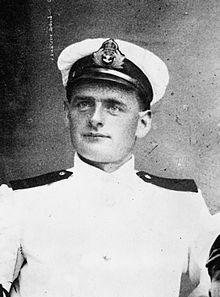Joseph Watt
| Joseph Watt | |
|---|---|
 |
|
| Born | 25 June 1887 Gardenstown, Banffshire |
| Died | 13 February 1955 (aged 67) Fraserburgh, Aberdeenshire |
| Buried | Kirktown Cemetery, Fraserburgh |
| Allegiance |
|
| Service/branch |
|
| Years of service | 1914–1918 1940–1945 |
| Rank | Chief Skipper |
| Commands held | HM Drifter Gowanlea |
| Battles/wars |
World War I *Serbian Campaign *Otranto Raid World War II |
| Awards |
Victoria Cross Croix de Guerre (France) Italian Silver Medal for Military Valour |
Joseph Watt, VC (25 June 1887 – 13 February 1955) was a Scottish recipient of the Victoria Cross, the highest and most prestigious award for gallantry in the face of the enemy that can be awarded to British and Commonwealth forces. He achieved the award during service in the Strait of Otranto and as a result of his meritorious service also received the French Croix de Guerre and the Italian Silver Medal for Military Valour.
Joseph Watt was born in 1887 in the Scottish fishing village of Gardenstown on the Moray Firth, into the large family of Joseph Sr. and Helen Watt. His father was a fisherman of many years service and his mother was also employed in the fish industry. At age ten his father was lost at sea in an accident, and the family moved to Fraserburgh in Aberdeenshire where his mother remarried. He learned the fishing trade from an early age and served aboard the White Daisy before purchasing a stake in the drifter Annie.
The war changed life in the community as most of the menfolk volunteered for service with the Royal Navy on the patrol service, hunting for enemy shipping and submarines, often in small drifters and trawlers similar to the ones they sailed in every day. Joe was no exception, being rated a skipper in the patrol service, and marrying Jesse Ann Noble in the days before his posting overseas. Transferred to Italy in 1915, Watt served on drifters in the Adriatic Sea, enduring boring patrol work keeping Austrian submarines from breaking into the Mediterranean Sea. During this time he was highly commended, for his role in the operation to evacuate the remnants of the Serbian Army following their defeat and retreat to Albania in January 1916 for which he was later awarded the Serbian Gold Medal for Good Service.
...
Wikipedia
